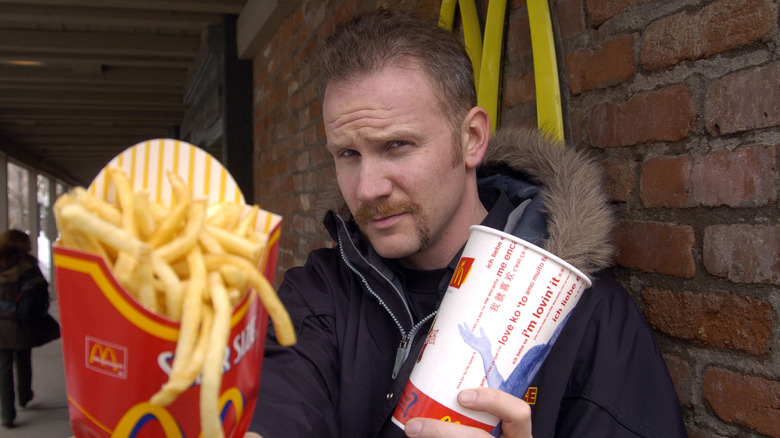The Super Size Me Controversy: Is It A McFib With A Side Of Lies?
In the early 2000s, few documentaries had a chokehold on American pop culture like "Super Size Me," a movie one can argue quite literally changed the world. The film, which chronicles independent filmmaker Morgan Spurlock's 30-day journey of eating only McDonald's, was an immediate mainstream juggernaut upon its May 2004 release.
Now, it's hard not to wonder: just how well does the movie fare under a more pronounced level of scrutiny, twenty years removed from its colossal cultural impact? Well, the answer is a bit complicated. "Super Size Me" accomplished its goal of showing that a diet consisting solely of fast food is certainly not ideal for one's health, with Spurlock gaining over 24 pounds in one month. It also created an incredible nightmare for McDonald's public image in the span of weeks. However, the liberties Spurlock took while making his film are hard to ignore.
For starters, viewers have long criticized Spurlock for not releasing official logs of what he consumed daily during the experiment. He also went into the documentary without informing his doctors of his consistent alcohol consumption (the filmmaker revealed in 2017 that he had been drinking regularly since he was 13 and, for 30 years, rarely, if ever, spent more than a week sober). As "Super Size Me" shows, this leads to the assumption that it is his daily eating habits — McDonald's three times a day — that seriously damage his liver. Had Spurlock shared this information before filming began, some of the overall results of his experiment would have likely been perceived in a drastically different light.
A couple years after the movie's release, a Swedish university attempted to replicate Spurlock's experiment, specifically, his end results; their conclusions were fascinating, to say the least.
Some of end results in Super Size Me are difficult to replicate
In 2006, Associate Professor Fredrik Nyström of Linköping University attempted to copy Spurlock's "Super Size Me" results. Nyström initially tasked seven of his students, all in their 20s, to eat like Spurlock for thirty days. Some leeway was given in terms of breakfast; students could eat bacon and eggs for their first meal, for example. They were also allowed to trade in burgers for pizza and didn't have to solely rely on McDonald's for their fast food – Nyström was more concerned with participants routinely consuming the necessary amount of saturated fats.
The findings of this experiment showed some stark differences from Spurlock's experience. The first group of students' livers showed some changes, but nothing as severe as what Spurlock went through. However, in later experiments, two participants in Nyström's study did show increased fat build up in the liver, with another having to be pulled from the experiment entirely due to liver issues. "Super Size Me" also showed the American filmmaker suffering from depression during the 30-day experiment; such a mental health impact was not reported in Nyström's experiment, nor were serious spikes in cholesterol levels.
Overall, it's difficult to look at "Super Size Me" now without attaching some asterisks to it. The documentary's findings can't be applied to everyone. As any medical professional will tell you, all bodies are different. It also might be hard for some viewers to look past the documentary's blunt parameters and think: "Who wouldn't gain weight after consuming such a high amount of calories everyday?"
For viewers wanting to find that next docu-drama to binge, be sure to check out Looper's coverage of 98 fantastic documentaries and 30 of Netflix's best documentaries.

